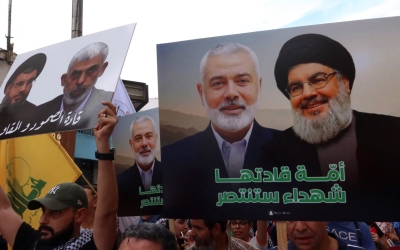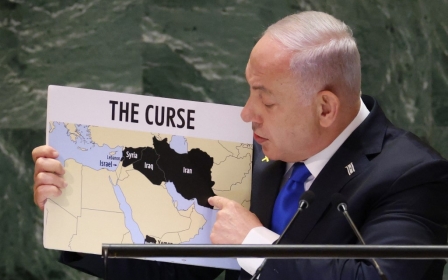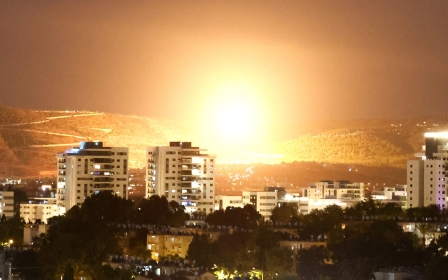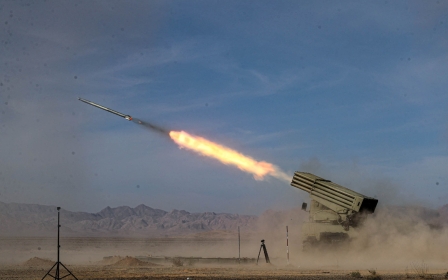How will Israel respond to Iran's missile attack?
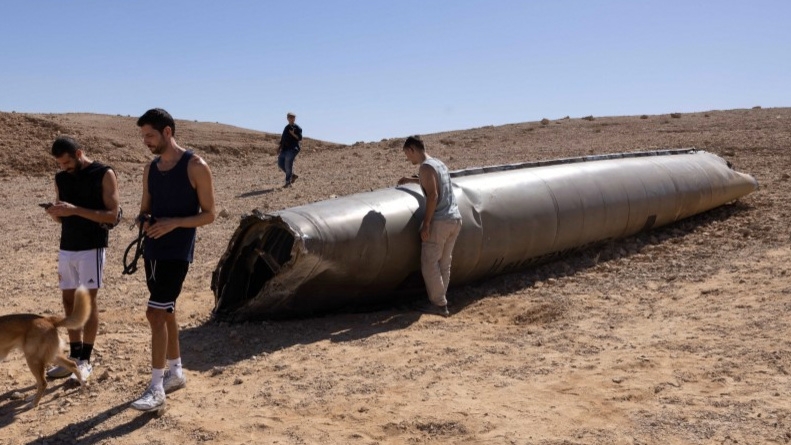
Iran’s missile attack on Israel earlier this month, following Israeli assassinations of top Hamas, Hezbollah and Iranian political and military leaders, has left many in the region wondering what comes next.
The attack fulfilled Iran’s delayed promise of revenge for the Israeli killings, thus satisfying domestic concerns about the consequences of inaction. But it also raised concerns about the looming Israeli response.
The mood in Tehran has been one of defiance, with Iranian officials vowing to respond to any Israeli attack. "We will respond more strongly and harshly if Israel responds to us," Iranian President Masoud Pezeshkian said earlier this month.
Another Iranian official mentioned that Tehran had communicated to Washington, via an intermediary, that any Israeli attack on Iran would be met with an "unconventional response" that includes targeting Israeli infrastructure.
General Hossein Salami, commander-in-chief of the Islamic Revolutionary Guard Corps (IRGC), warned the Israelis: “We tell you that if you commit any aggression against any point, we will painfully attack the same point of yours.”
New MEE newsletter: Jerusalem Dispatch
Sign up to get the latest insights and analysis on Israel-Palestine, alongside Turkey Unpacked and other MEE newsletters
Observers point out that if and when Israel retaliates, Iran will have to bear the onslaught alone while the United States and its European partners continue their support of Israel.
Over the past year, the West has aided and abetted Israel's genocidal war against Gaza, now extending to Lebanon.
Iran’s strategic allies, Russia and China, however, remain ambiguous in their positions, often calculating their next moves based on their own national interests.
Iranian vulnerabilities
Shortly after Iran's missile attack, Israel vowed retaliation, with Prime Minister Benjamin Netanyahu saying in a statement: "[Iran] does not understand our determination to defend ourselves."
In Tehran, a number of scenarios have been suggested as to how Israel's attack could look and what may be targeted: from cyber sabotage to attacking military bases and hitting civilian infrastructure. Israel could opt to strike petrochemical sites, assassinate more high-ranking Iranian military officials and commanders or even target nuclear facilities.
Follow Middle East Eye's live coverage of the Israel-Palestine war
Behrouz Kamalvandi, spokesperson for the Atomic Energy Organization of Iran (AEOI), said an Israeli attack on the country’s nuclear sites was improbable. But if it were to happen, any damage could be “quickly compensated”. Iranian Foreign Minister Abbas Araghchi warned that if Gulf states allow Israel or the US to use their skies or bases against Iran, Tehran would retaliate.
Meanwhile, General Ali Fadavi, deputy commander-in-chief of the IRGC, has dismissed the threat posed by Israel, remarking: “That land is a small land. It’s not even as big as one of Iran’s small provinces.”
Striking Iranian nuclear facilities, located deep underground and in central territory, would require a broader military effort from Israel and access to American 'bunker buster' bombs
Israel’s response will ultimately depend on future assessments and US cooperation. However, beyond the type and quality of its response, a decade of bilateral confrontations has shown that Iran has been on the receiving end of numerous Israeli attacks.
On the cyber sabotage front, a group linked to Israel managed to hack the fuelling systems of gas stations in cities across Iran. Israel was also accused of carrying out a sophisticated cyberattack at the Shahid Rajaee port facility.
When it comes to assassinations, Israel has killed Iranian nuclear scientists and military officials. In a massive blow, it assassinated former Hamas political chief Ismail Haniyeh while he was a guest of the state in Tehran this past summer.
Another notable operation was the 2011 killing of General Hassan Tehrani Moghaddam, the father of Iran’s rocket programme, in a massive explosion at a military base outside Tehran. Israel has also stolen crucial documents and sabotaged Iranian nuclear facilities.
'Psychological warfare'
An Israeli attack on industrial and urban infrastructure, including oil installations, could lower the risk of inciting an all-out war with Iran compared to the potential fallout from a strike on the country’s nuclear sites.
Iran’s oil facilities, such as the Assaluyeh port and Kharg Island terminal, are more accessible because they are located in the country’s south, and a large-scale blaze caused by an Israeli attack would generate significant media coverage.
Striking Iranian nuclear facilities, located deep underground and in central territory, would require a broader military effort from Israel and access to American "bunker buster" bombs. However, US President Joe Biden has opposed the notion of an Israeli attack on Iranian nuclear sites.
The Biden administration’s role in the conflict has also drawn responses from Iranian officials. Iran’s defence minister, Brigadier-General Aziz Nasirzadeh, downplayed the recent US deployment of the high-altitude Thaad anti-missile system to Israel as “psychological warfare”, saying that “it is not anything new” and raises “no specific problem”.
Vahid Ahmadi, a member of Iran’s parliamentary national security committee, added that Iran "has the capability to strike" the Thaad system.
Speculation has also arisen about Israel targeting Iran's Kharg Island facility, which is reportedly the source of around 95 percent of Iranian oil exports. Refineries involved in the production of gasoline could also be targeted, as Israel likely considers Iran to be more vulnerable in this sector. Iran’s air defence system would be unable to thwart a full-scale Israeli attack.
Overall, Iran’s missile attack on Israel was an effective measure to satisfy a segment of the Iranian population, but the risk of Israel’s response has put the country on the verge of a full-scale war. While it remains to be seen how Israel will retaliate, the mood in Tehran is one of defiance.
The views expressed in this article belong to the author and do not necessarily reflect the editorial policy of Middle East Eye.
Middle East Eye delivers independent and unrivalled coverage and analysis of the Middle East, North Africa and beyond. To learn more about republishing this content and the associated fees, please fill out this form. More about MEE can be found here.



